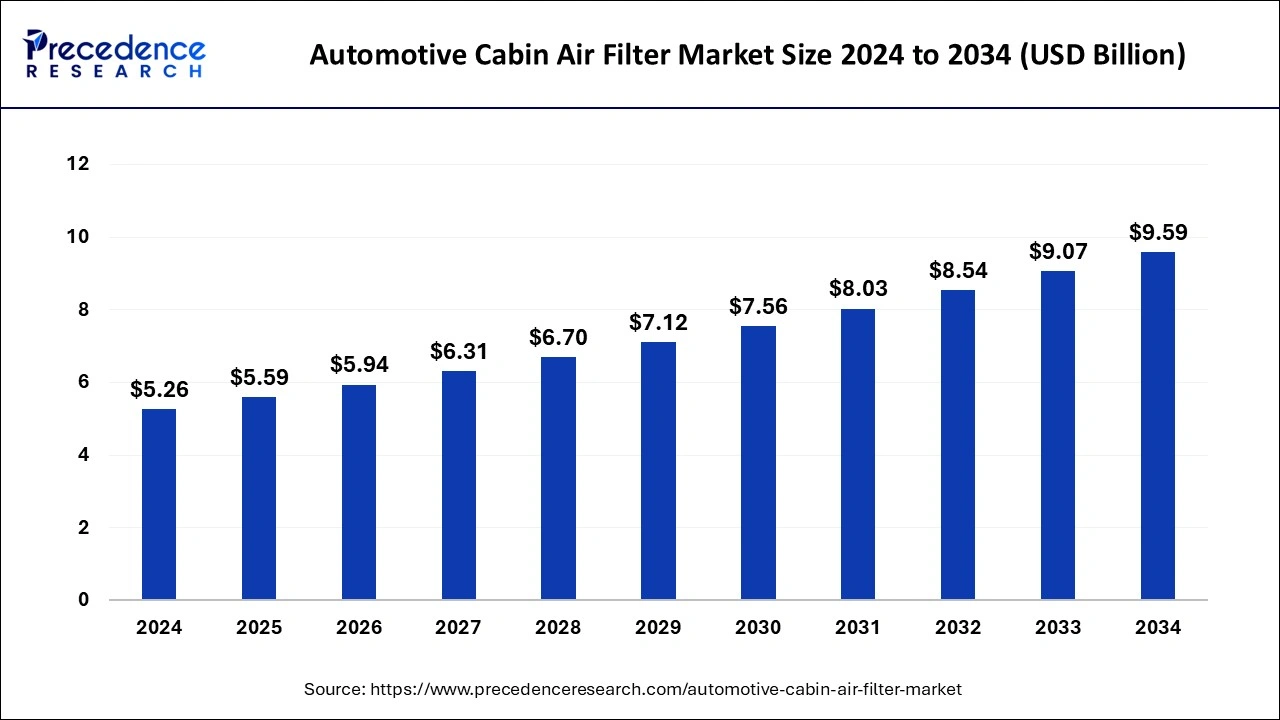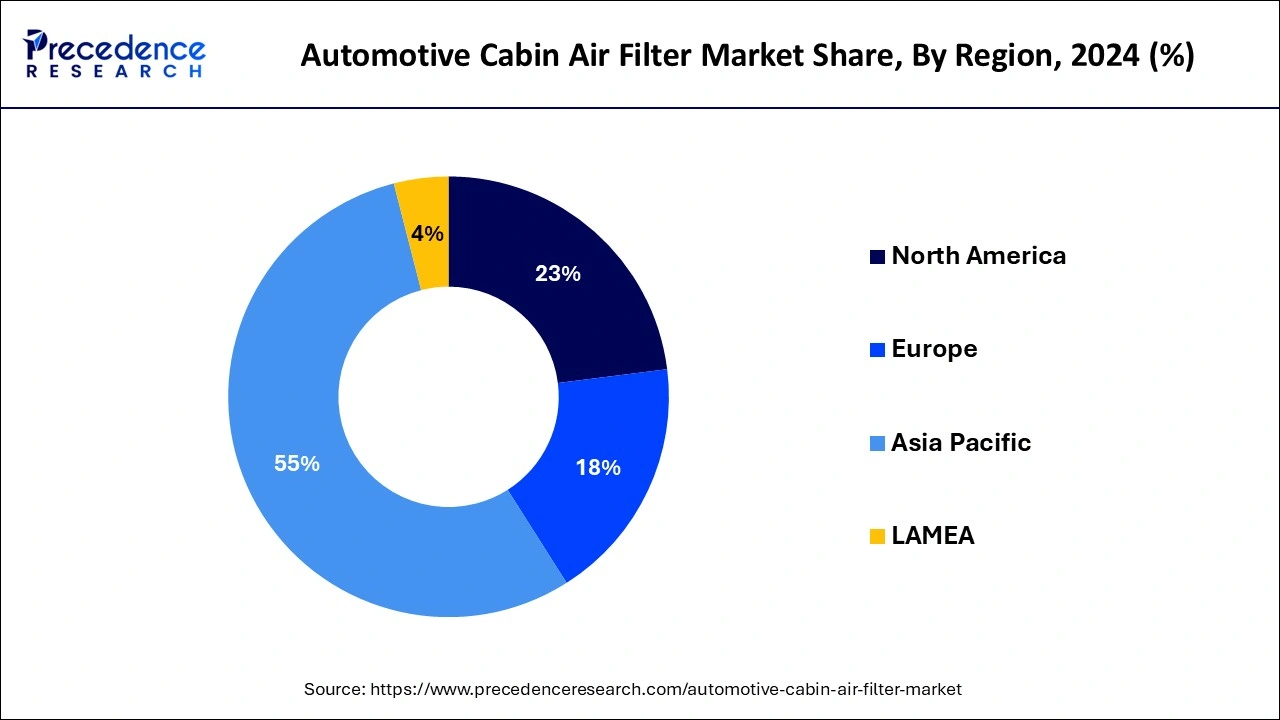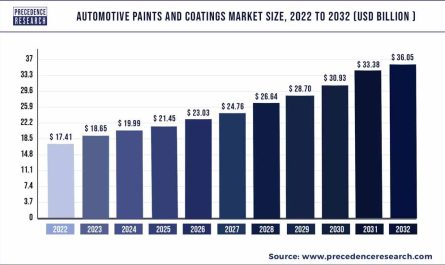The global automotive cabin air filter market size reached USD 4.95 billion in 2023 and is projected to cross around USD 9.07 billion by 2033 with a notable CAGR of 6.24% from 2024 to 2033.

The global automotive cabin air filter market has witnessed significant growth in recent years, driven by increasing awareness regarding air quality inside vehicles and stringent regulations regarding vehicle emissions. Cabin air filters play a crucial role in ensuring clean air circulation within the vehicle cabin, filtering out pollutants, allergens, and harmful particulate matter that can affect passenger health. With rising urbanization and vehicle ownership rates globally, the demand for cabin air filters continues to grow, spurred by consumer concerns for healthier and more comfortable driving environments.
Get a Sample: https://www.precedenceresearch.com/sample/4384
Automotive Cabin Air Filter Market Key Points
- Asia Pacific dominated the automotive cabin air filter market in 2023.
- By vehicle type, the mid-sized passenger cars segment accounted for the largest market share in 2023.
- By filter medium, the synthetic filters segment dominated the market in 2023.
- By sales channel, the OEMs (original equipment manufacturers) segment dominated the market in 2023.
Regional Insights
North America holds a substantial share in the automotive cabin air filter market, driven by stringent emission norms and a high level of awareness among consumers regarding air quality issues. The United States and Canada are key markets within this region, with automotive manufacturers increasingly integrating advanced filtration systems into their vehicles to comply with environmental regulations and meet consumer expectations for air quality standards.

Europe is another prominent market for automotive cabin air filters, characterized by stringent emission regulations such as Euro 6 standards and a strong emphasis on vehicle interior air quality. Countries like Germany, France, and the UK lead the adoption of cabin air filtration technologies, with automakers focusing on advanced filter designs and materials to enhance filtration efficiency and durability. Asia Pacific emerges as a fast-growing region in the automotive cabin air filter market, fueled by rapid industrialization, urbanization, and a burgeoning automotive industry in countries like China, Japan, and India. Increasing disposable incomes and growing awareness of air pollution-related health issues among consumers are driving the demand for cabin air filters in passenger cars and commercial vehicles across the region.
- The Asia Pacific automotive cabin air filter market size was estimated at USD 2.72 billion in 2023 and is predicted to be worth around USD 5.03 billion by 2033 with a CAGR of 6.34% from 2024 to 2033.
- The North America automotive cabin air filter market size was calculated at USD 1.14 billion in 2023 and is projected to expand around USD 2.13 billion by 2033, poised to grow at a CAGR of 6.45% from 2024 to 2033.
Trends in the Automotive Cabin Air Filter Market
Shift towards Advanced Filtration Technologies
There is a noticeable trend towards advanced filtration technologies in automotive cabin air filters, including activated carbon filters, HEPA (High Efficiency Particulate Air) filters, and combination filters. These technologies offer enhanced filtration efficiency, capturing a wider range of pollutants, allergens, and harmful gases compared to traditional particulate filters.
Integration of Smart Filter Systems
Automakers are increasingly integrating smart filter systems in vehicles, equipped with sensors and IoT (Internet of Things) capabilities to monitor air quality in real-time. These systems can automatically adjust airflow and activate filtration modes based on external air quality conditions, providing passengers with cleaner and healthier cabin environments.
Sustainable and Eco-friendly Materials
There is a growing emphasis on sustainable and eco-friendly materials in the manufacturing of automotive cabin air filters. Manufacturers are exploring bio-based filter materials and recyclable components to reduce environmental impact and meet regulatory requirements for sustainability.
Customization and Personalization
Consumer preferences for customizable and personalized cabin air filtration systems are on the rise. Automakers and aftermarket providers are offering options for cabin air filters that cater to specific allergen sensitivities, regional air quality conditions, and personal comfort preferences, enhancing customer satisfaction and driving market growth.
Automotive Cabin Air Filter Market Scope
| Report Coverage | Details |
| Automotive Cabin Air Filter Market Size in 2023 | USD 4.95 Billion |
| Automotive Cabin Air Filter Market Size in 2024 | USD 5.26 Billion |
| Automotive Cabin Air Filter Market Size by 2033 | USD 9.07 Billion |
| Automotive Cabin Air Filter Market Growth Rate | CAGR of 6.24% from 2024 to 2033 |
| Largest Market | Asia Pacific |
| Base Year | 2023 |
| Forecast Period | 2024 to 2033 |
| Segments Covered | Vehicle Type, Sales Channel, Filter Medium, and Regions |
| Regions Covered | North America, Europe, Asia-Pacific, Latin America, and Middle East & Africa |
Vehicle Type
The Automotive Cabin Air Filter Market is segmented by vehicle type into passenger cars and commercial vehicles. Passenger cars dominate this segment due to their higher production volume and widespread adoption of cabin air filtration systems. These filters are crucial in passenger cars for maintaining air quality inside the vehicle cabin, filtering out pollutants, allergens, and particulate matter from external air sources. With increasing consumer awareness and stringent regulations regarding air quality and cabin comfort, passenger car manufacturers are increasingly integrating advanced cabin air filtration systems, thereby driving market growth in this segment.
Commercial vehicles, including trucks, buses, and other heavy-duty vehicles, also utilize cabin air filters to enhance driver and passenger comfort and maintain air quality. The demand in this segment is primarily driven by regulatory mandates for cleaner cabin air and the growing adoption of advanced filtration technologies to ensure driver health and safety.
Sales Channel
The Automotive Cabin Air Filter Market sales channels include OEMs (Original Equipment Manufacturers) and aftermarket. OEMs represent filters that are installed during vehicle manufacturing, either by the vehicle manufacturer itself or its suppliers. OEMs typically offer cabin air filters as part of a broader package of components aimed at enhancing vehicle comfort and safety. Factors such as vehicle production volumes, new vehicle sales, and technological advancements in filtration systems influence the OEM segment’s growth.
The aftermarket segment comprises filters sold separately from vehicle manufacturers through various distribution channels such as auto parts retailers, online platforms, and independent service centers. Aftermarket filters cater to vehicle owners seeking replacement or upgrade options beyond the OEM-supplied filters. This segment benefits from a broader consumer base, including vehicle owners looking to maintain or improve air quality inside their vehicles, driven by factors like air pollution levels, allergen concerns, and personal health considerations.
Filter Medium
Filter medium refers to the material used within cabin air filters to trap and remove airborne contaminants. Common filter media include particulate filters (made of paper, synthetic fibers, or a combination thereof) and activated carbon filters.
Particulate filters are designed to capture dust, pollen, mold spores, and other fine particles suspended in the air, thereby improving indoor air quality and preventing respiratory issues. They are typically efficient and cost-effective, making them widely used across both passenger cars and commercial vehicles.
Activated carbon filters, on the other hand, incorporate activated carbon granules or fibers that adsorb gases, odors, and harmful volatile organic compounds (VOCs) from the air passing through the filter. These filters are effective in reducing unpleasant odors and harmful chemicals inside the vehicle cabin, providing enhanced comfort and health benefits.
Automotive Cabin Air Filter Market Dynamics
Drivers
Increasing Vehicle Production and Sales
The global automotive industry continues to expand, driven by rising consumer demand for passenger cars and commercial vehicles across various regions. This growth in vehicle production directly correlates with the demand for automotive cabin air filters, as automakers prioritize cabin air quality to meet regulatory standards and consumer expectations.
Rising Concerns over Air Pollution and Health
Growing awareness of the health impacts of air pollution is a significant driver for the automotive cabin air filter market. Consumers are increasingly concerned about exposure to pollutants, allergens, and harmful gases while driving, leading to higher demand for effective cabin air filtration systems that can improve indoor air quality and protect passenger health.
Stringent Regulations on Vehicle Emissions
Government regulations mandating lower vehicle emissions and improved air quality standards are key drivers influencing the automotive cabin air filter market. Automakers are compelled to integrate efficient cabin air filtration systems into vehicles to comply with emission norms such as Euro 6 in Europe and Bharat Stage VI (BS-VI) in India, driving market growth.
Technological Advancements in Filtration Systems
Continuous advancements in filtration technologies, including the development of next-generation filter materials and smart filtration systems, are driving innovation in the automotive cabin air filter market. Manufacturers are investing in research and development to enhance filtration efficiency, durability, and user experience, catering to evolving consumer preferences and regulatory requirements.
Opportunities in the Automotive Cabin Air Filter Market
Expansion of Aftermarket Sales
The aftermarket segment presents lucrative opportunities for automotive cabin air filter manufacturers and suppliers. With an increasing number of vehicles on the road and growing awareness among vehicle owners about the importance of regular filter replacement, the aftermarket for cabin air filters is expected to witness significant growth.
Penetration into Emerging Markets
Emerging markets in Asia Pacific, Latin America, and Africa offer substantial growth opportunities for automotive cabin air filter manufacturers. Factors such as rising disposable incomes, urbanization, and improving air quality regulations present favorable conditions for market expansion in these regions.
Collaboration and Partnerships
Collaborations between automotive OEMs, filter manufacturers, and technology providers present opportunities for innovation and market expansion. Partnerships aimed at developing advanced filtration solutions, integrating smart technologies, and enhancing distribution networks can drive competitiveness and market growth.
Focus on Electric and Hybrid Vehicles
The growing adoption of electric vehicles (EVs) and hybrid vehicles presents new opportunities for automotive cabin air filter manufacturers. These vehicles require specialized filtration systems to maintain air quality within the cabin, creating a niche market for filters optimized for electric drivetrains and zero-emission vehicles.
Challenges Facing the Automotive Cabin Air Filter Market
Cost Constraints and Price Sensitivity
Price sensitivity among consumers and automakers poses a challenge for automotive cabin air filter manufacturers. The cost of advanced filtration technologies and eco-friendly materials can impact product affordability, potentially limiting market penetration, especially in price-sensitive regions and market segments.
Supply Chain Disruptions and Raw Material Costs
Global supply chain disruptions and fluctuations in raw material costs pose challenges for automotive cabin air filter manufacturers. Dependency on imported raw materials and components can lead to supply chain vulnerabilities, affecting production schedules and overall market competitiveness.
Regulatory Compliance and Certification
Meeting stringent regulatory requirements for emission standards and indoor air quality poses challenges for automotive cabin air filter manufacturers. Compliance with regional and international standards necessitates continuous investment in research, testing, and certification, adding complexity and cost to product development and market entry.
Competition from Air Purification Systems
The automotive cabin air filter market faces competition from alternative air purification systems and technologies, such as standalone air purifiers and HVAC (Heating, Ventilation, and Air Conditioning) systems with integrated filtration. These alternatives offer comprehensive air purification solutions beyond cabin filtration, challenging the market positioning of cabin air filters alone.
Read Also: Cable Cars and Ropeways Market Size to Surpass USD 13.54 Mn by 2033
Automotive Cabin Air Filter Market Recent Developments
- In December 2023, UNO Minda and ROKI made a partnership to provide a spectrum of air filters for the automotive market, such as oil filters, air filters, and fuel filters, to be sold in the Indian aftermarket, which can be used in commercial vehicles.
- In January 2023, K&N Engineering announced that it had created a new industrial group aiming at the delivery of high-performance and sustainable air filtration solutions for various industrial applications.
Automotive Cabin Air Filter Market Companies
- Ahlstrom-Munksjo Oyj
- DENSO Corp.
- Donaldson Co. Inc.
- Freudenberg SE
- General Motors Co.
- MAHLE GmbH
- MANN+HUMMEL
- Parker Hannifin Corp.
- Robert Bosch GmbH
- Sogefi Spa
Contact Us:
Mr. Alex
Sales Manager
Call: +1 9197 992 333
Email: sales@precedenceresearch.com
Web: https://www.precedenceresearch.com
Blog: https://www.expresswebwire.com/

